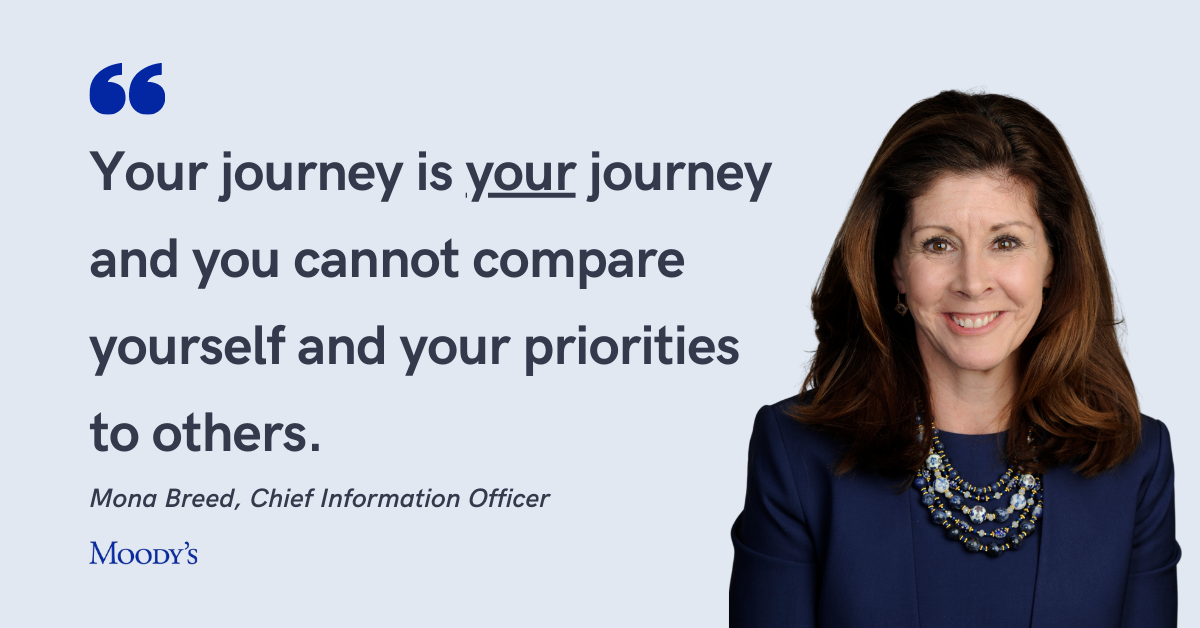Mona Breed never planned to be the Chief Information Officer at a financial services company. But here she is, two years into her role as CIO at Moody's Corporation, overseeing all of the enterprise components of the company's technology, from information security to infrastructure to data.
She's a long way away from the green English major who first entered the world of tech a few decades ago.
Mona got her start in tech in a pilot program for PW (before they were PWC) as a management information consultant. She graduated right after the stock market crash in 1987 and found herself entering the job market in the middle of economic uncertainty, a situation that many new grads (and mid- and late-career people, too) are facing today. "There weren't a lot of writing opportunities," says Mona, who decided to take the offer at PW despite the fact that she had "never really even turned on a computer" before her first day there.
The company had decided to hire liberal arts grads to see if their non-traditional educational background would bring in different skills and perspectives to complement the people hired from computer science backgrounds. The idea was that the liberal arts grads could be taught to code relatively easily. That's not quite how Mona found it.
"It was the first time in my life where I really felt like I was failing," she remembers. "I was so far behind my peers and I had to work so hard. And in fact, I think a lot of them would be kind of surprised that I stuck it out with technology."
But she did stick it out, transitioning from her consultant role to other tech-focused roles within different departments at PW and, later, at other companies as well. Looking back on her career now, she's confident she made the right choice in staying in the industry she happened to find her way into as a new grad. "What kept bringing me back to technology was really getting to delight people. You build something that makes somebody's life better," she says.
We sat down with Mona to hear what advice she has for women seeking to advance their careers in the middle of a precarious job market and economic uncertainty:.
1. Take the stuff that no one else wants.
If there is a project or a responsibility that everyone else on your team is actively avoiding, Mona recommends volunteering yourself. It sounds risky, but it's worth it, she promises, crediting this approach with giving her valuable opportunities to level up in her career, whether that's from developing go-to-market strategies for new products, working on a wide range of technologies, or overseeing major financial transformations.
"I learned early on that if everyone else was running away from those sorts of things, you might have more time to figure it out and define it without as many people watching over your shoulder," she says.
2. Don't have one set dream role from the beginning.
We opened this article saying that Mona never planned to be a CIO, and that's true. For the first 20 years of her career, she took on jobs and prioritized opportunities because they were interesting or could teach her new things, not because she saw them as stepping stones towards an eventual end goal she'd been slowly plotting towards.
It wasn't until a few years ago that she realized she wanted to try her hand at enterprise-level management and set out to make sure she had all of the necessary skills. As it turns out, because she had taken on such a variety of roles across different departments and companies, she had very few holes to fill when she was ready to look at C-suite roles.
That's why Mona recommends that other women stay open-minded to various opportunities and let their "dream role" come to them over time, versus trying to force it early in their career—that way you get the benefit of having a wide set of experience and expertise, wherever you end up. She suggests asking yourself "What do I want to learn?" and looking for roles that fulfill that curiosity.
3. Put your name in the ring.
Being open to new opportunities doesn't mean just letting them come to you, though, says Mona. Sometimes you have to ask for them.
Once Mona had decided to get "C-suite ready", she realized there was one area she needed more experience in: core infrastructure. So when a coworker retired, she went to her boss and asked him to let her take over that open role to get experience there.
"He was hesitant at first, because I didn't have experience in that," Mona says. But he gave her a trial period in the role, and in that time, Mona built up a team and proved that she could manage in that space. "I went two and a half years of going really deep," she says. "And once I had that, I was more of a candidate for a lot of companies in terms of CIO or CTO roles. That was probably the most deliberate decision of my career, to take on that infrastructure role, because if I wanted to be a CIO or CTO, that was going to differentiate me."
4. Good leaders know they don't know everything.
It can be tempting to get into a new role and feel like you have to prove your worth by not needing any help. But if you want to grow your career into upper-level management, says Mona, you have to get comfortable with knowing when you're in over your head.
"When you're more junior in your career, you sort of move up vertically. When you take your next role, you are very capable of doing the jobs of the folks reporting to you. But as I started to progress and move higher in my career, that became less the case," says Mona. "It's about really letting go of, 'Hey, I have to be the person who knows all the answers or can tell all these people how to do their job,' and getting to the point where you have that humility."
5. Don't just accept feedback—embrace it.
A key part of not knowing everything is knowing that you'll sometimes get things wrong, and Mona says it's vital to seek out people who will tell you the "cold, hard truth, even when you don't want to hear it."
"Whether that's in the form of a manager, mentor, or peers—for me it's always been a combination of all of those things—you need to actively seek that feedback and really embrace it, own it, and figure out how to deal with it," she says.
6. Don't compare your timeline to others'.
Have you ever wondered if you're falling behind your peers or how your success compares to theirs? That's understandable, but ultimately unproductive, says Mona: "your journey is your journey and you cannot compare yourself and your priorities to others."
She uses as an example the comparatively longer time it took her to get to the C-suite relative to some of her peers, particularly when she took a year off to see if she wanted to stay at home after her first child was born. She didn't—"I ran screaming back to the office with a cup of coffee," she jokes—but it was important for her to take that time and test it out, because it lined up with her own personal priorities.
"I'm actually happy now that it took me longer to figure this out, because each step earns me experience and credibility. I got seasoning and had time to really learn, experience, and develop so that I'm much more confident in making difficult decisions and facing unplanned challenges," she says.
7. Stay connected to the external marketplace
Stay connected professionally to other companies and your professional network. Mona says that throughout her career she has periodically pushed herself to go on external interviews and does so for two reasons.
First, it keeps her "up to date" and aware of what's going on in the market and with her competitors. And second, it often helps her to appreciate the company she works for and the job she currently has, letting her return to it with fresh passion.
"I've found that [an interview] often makes me value what I have in front of me. If I'm feeling stuck, I go explore other roles, internal and external, and sometimes realize that what I have right here is awesome, I just wasn't focused on the positives. I was getting stuck in some of the things that I didn't like," says Mona.
If you're feeling unmotivated at your current role, push yourself to go see what's out there, or explore another role internally. Either you'll find an opportunity that's more lined up with what you want to learn, or you'll further appreciate the opportunity you have right in front of you.
8. And last but not least: rescue yourself.
"I go back to one of my very early managers who said you must actively participate in your own rescue," says Mona. "I think this speaks to the accountability and the responsibility for your happiness, your trajectory, and your progression. How you're coping with things is really largely up to you. You can cite the situation of 'everyone's getting promoted and I'm not.' But you are never stuck. You may choose to be stuck, but you're not actually stuck."
If you're feeling lost in your career, remember that you have options—even during a pandemic. Seek out new opportunities internally, says Mona, and volunteer for projects that interest you; make sure you're looking externally, too, and don't be afraid to leave if you can find what you're looking for elsewhere.
If you're interested in opportunities at Moody's or just want to learn more about their culture, check out their PowerToFly page here.




